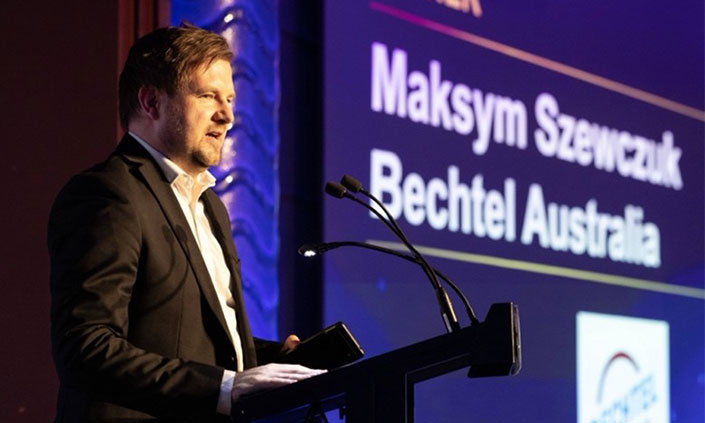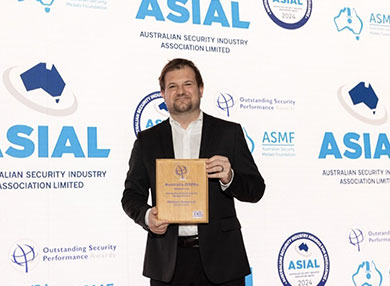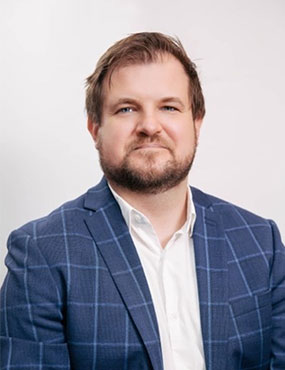Protecting people and places
Maksym Szewczuk shows how a Macquarie degree creates opportunities. From writing to risk, his journey proves your degree is just the beginning.

It’s a little-known truth that if you do what you’re good at and what you enjoy – and, Maksym Szewczuk would add, keep networking and be open to a range of roles – you can expect a rich and rewarding career, no matter how diverse your skills or interests.
"I’d be a rare example of someone with two vastly different degrees, English and security studies, who has applied both in my career," Mr Szewczuk says.
In his undergraduate days, however, it would have been difficult to foresee such a convergence. "I knew I wanted to go into something that is now known as critical infrastructure protection and security, but at the time I couldn’t put my finger on what that would be," he says.
Degrees in security were yet to be offered in Sydney, so Mr Szewczuk enrolled in arts at Macquarie, majoring in psychology because of its broad application in the workforce and the University’s reputation in the field.
"At the time, most graduate roles were agnostic in terms of what you’d studied," he recalls.
With that relative freedom, Mr Szewczuk transferred from psychology to English to follow his interest in writing. "My studies gave me a good grounding in communication and writing in both an academic and creative sense. Studying under practitioners like the Australian poet Robert Gray was thought provoking and insightful, and one of my best undergraduate memories."
Indeed, despite pursuing a career in security, Mr Szewczuk’s undergraduate degree has not gone to waste – the note-taking and brainstorming that led to his first book, the medieval fantasy One Knight Stand, began at Macquarie. "I remember doing several creative writing and literature subjects. It has taken me years to get it all down, but it all started in the notes I took back then."
He’s now writing the second instalment in this series. "Working in engineering, design and construction doesn’t allow for a lot of creative expression, so I've turned that into a side passion, writing once the kids are in bed or on the train home, slowly piecing the books together," Mr Szewczuk says,
"It takes patience and an internal silence to switch modes, but it’s a good creative outlet and sharing my stories is rewarding," he says. He draws on overseas travels, discovering castles with his young family, which fires his imagination to create his heroes’ and heroines’ adventures.
"The genre allows me to write allegorically in a medieval setting I’m familiar with. I like the messaging that a lot of good fantasy storytelling can deliver in a fun way, with swords and magic and all those sorts of things that people enjoy."
Of course, his writing includes publishing non-fiction articles – his most recent is a guide to navigating security careers – and co-authoring an Australian Standards security handbook. But it’s here that you start to see the links between Mr Szewczuk’s creative and professional pursuits, which all boil down to protecting people and places. And a little bit of luck.
"After graduation, I worked for the Department of Defence and was slowly exposed to security risk-assessment work before getting into more specialised roles and undertaking a TAFE certification to get my security license," Mr Szewczuk says. "By chance, I met someone at a party who advised on and designed security for big projects. Coincidentally, they had a graduate security advisor role open, which they offered me a week later. The rest is history."

Mr Szewczuk has worked on complex, critical infrastructure projects, from Western Sydney International Airport to CommBank Stadium, the Sydney Metro, the planned city of NEOM in Saudi Arabia and the Los Angeles Metro, but says they all have similar challenges, balancing security requirements, adhering to security or safety risk profiles and meeting project budgets while finding creative solutions to usability, visual and aesthetic requirements.
Naturally, there’s a certain pride that comes from contributing to the design of iconic infrastructure which will be used for generations. "The ability to have a real, tangible impact on people’s wellbeing in terms of safety and security is a key motivator – and being able to show my kids what Dad helped build is extremely rewarding," Mr Szewczuk says.
With more terror threats, changing crime profiles and a vast increase in cyberattacks in the past 20 years, both industry and the education sector have responded. ‘Macquarie University was the first in Sydney to offer a postgraduate program in security studies, which fit with what I wanted to do, so I took on the Master of Policing, Intelligence and Counter Terrorism.
"I was in the second cohort, so it was still new to both students and lecturers," Mr Szewczuk says. "The course was great, providing the theoretical underpinnings of security studies, counter terrorism and intelligence. Practising lecturers like Lydia Khalil, now a Program Director of the Transnational Challenges Program at the Lowy Institute, shared a wealth of industry experience."
Study is just the start of any professional journey. "You quickly learn how little you know and how much more there is to learn," he says, emphasising the importance of networking for early career professionals and taking on varied roles, duties and specialities.
"The supportive, networked and resourced industry of today didn’t exist when I started – that’s why I’m driven to give back and share my experience," Mr Szewczuk says. "The industry is welcoming and in need of new and emerging talent to solve the complex security challenges of tomorrow," he adds, encouraging industry professionals to connect with him on LinkedIn and alumni to attend events.
"Networking is critical to career growth. My professional society, ASIS International (NSW Chapter), partners with the Macquarie University Security Society (MacSec), and together we run information sessions on careers, hold networking nights and industry-focused presentations. Students appreciate the knowledge and career networking advice they receive from professionals who often have 10 or 20 years of experience," he says.
In 2024, Mr Szewczuk was awarded Australia’s Most Outstanding In-House Security Manager by the Australia Security Industry Association Limited (ASIAL) in the Outstanding Security Performance Awards (OSPAs), and was a finalist for the global award. He was also a finalist for Australian Risk Manager of the Year 2025.
With his work on Western Sydney’s airport now complete, Mr Szewczuk has started a new role as Security Lead for Bechtel, working on upcoming mega-projects in Australia and around the world, proving you just never know where a degree from Macquarie University will lead you.

Maksym Szewczuk's bio
Maksym Szewczuk holds a Bachelor of Arts in English (2005) and a Master of Policing, Intelligence and Counter-terrorism (2009). He is a distinguished security and risk manager at Bechtel Corporation, where he oversees the protection of large-scale, critical infrastructure projects around the world.
Winner of the 2024 OSPA Outstanding In-House Security Manager award and a global finalist, Mr Szewczuk has worked in a variety of roles and organisations, including as a security design manager for Ausgrid, where he oversaw an extensive capital works program to improve the safety, security and resilience of the power network.
Mr Szewczuk has also worked as a security consultant and security solutions advisor, providing risk management, security design and bespoke services to universities, including Macquarie University and UNSW, as well as Sydney Metro, NSW Parliament House and high-net-worth individuals. He has worked on mega projects in Saudi Arabia and California, and advised on safety and security related to homelessness and crime across greater Los Angeles. With more than 20 years of experience, his expertise spans security risk mitigation, physical security design, project risk management and engineering design.
As a passionate advocate for developing young security professionals while highlighting diversity, equity and inclusion in the industry, he champions safety and resilience in infrastructure and leads initiatives to uplift industry standards. His contributions include co-authoring the Australian Standards Handbook HB-188 Base-building Physical Security Handbook – Terrorism and Extreme Violence, and he regularly shares his insights through articles in leading industry journals.
Mr Szewczuk’s portfolio of globally recognised security certifications, including top-level credentials in security management, physical security and nuclear security, underscores his commitment to excellence. Additionally, his election to serve on the NSW Police Security Industry Council highlights his dedication to advancing professionalism and standards in the security industry, making him a respected voice and visionary in his field.